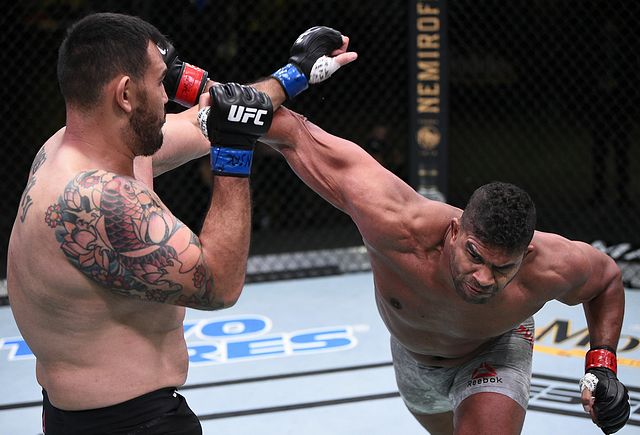Editor’s note: The views and opinions expressed below are those of the author and do not necessarily reflect the views of Sherdog.com, its affiliates and sponsors or its parent company, Evolve Media.
* * *
Consider this a hot take if you must, but know that it is still a sincere one. The more I think about it, the more I’m inclined to immodestly propose that Alistair Overeem as the greatest heavyweight ever in mixed martial arts.
Hear me out.
Accusations of recency bias are expected—and valid. MMA pundits are notorious for being overeager in anointing the latest greatest fighter, and Overeem didn’t even make the Top 10 cut when I analyzed the greatest heavyweights four years ago. Surely beating Augusto Sakai—a solid heavyweight with a bright future but by no means a career high—at UFC Fight Night 176 doesn’t suddenly vault him into the all-time elite, let alone definitively place him ahead of Fedor Emelianenko, Fabricio Werdum or Stipe Miocic.
Beating Sakai is far from Overeem’s best or most notable win. Unless Sakai goes on to become a champion, the win probably won’t even stand out all that much. What it did, however, was make me reassess what greatness means and what it looks like.
Typically, when we talk about what separates good fighters from great ones or the GOATS from the Greats, we think in terms of a few set parameters. They have to have won a high-level championship and established a reign of some sort, usually through lengthy title defense sprees. Next, they have to have bested their rivals, with extra points given to those who either jumped around in weight or stuck around long enough to have rivalries stretch into multiple eras. Finally, they have to have beat the best opponents available, preferably in memorable fashion. Other criteria worth considering mostly branches out from those three domains.
Overeem clearly satisfies a number of those qualifiers. He was the inaugural heavyweight champion for both Strikeforce and Dream, though neither included much of a defined reign. He certainly had rivalries, perhaps most notably winning two of his three fights against Werdum, though he did not fare too well against his light heavyweight nemeses. Of course, there is no denying the insane level of competition he has faced throughout his career. A proper recall of his notable opponents would compose a paragraph of Fight Finder hyperlinks.
Yet what makes Overeem most impressive and truly puts him in a class of his own does not compute with those traditional parameters: longevity. He is not a model of longevity for longevity’s sake; there is little dignity in simply sticking around too long and compiling losses. As the win over Sakai demonstrated, Overeem is still taking on and defeating tough, legitimate fighters well into his storied career. Many fighters have fought into their 40s, but none have been as consistently successful for as long Overeem, who scored a win against a Top 10 opponent in his 66th pro MMA fight on Saturday in Las Vegas. This is especially impressive at heavyweight, where, despite a dearth of talent compared to other divisions, it is easiest to get knocked out.
It wasn’t just the win, either. It was how he won. After weathering early adversity in the first two rounds, Overeem started playing the long game by punishing Sakai with body shots, takedowns and high-pressure top control. For someone who has been at this since “Fight Club” was in theaters, he still has the ability to change things up when his primary offense—his K-1 championship-level kickboxing—isn’t enough. After 21 years of footage and mileage on him, he can still beat good fighters through the depth and diversity of his skill set.
The span of his career cannot be understated. By the time Miocic made his professional debut, Overeem was 34-11 and held the Strikeforce championship. He had 13 fights by the time Werdum made his professional debut. Emelianenko started fighting about seven months after Overeem, but he hasn’t had a good win since 2009 and took three and a half years off, from June 2012-December 2015. Overeem had seven fights while Emelianenko was on the shelf, including a win over former UFC champion Junior dos Santos. Of course, a lengthy title run with a bunch of defenses will always be the quintessential accomplishment, but looking at the totality of a career, it’s a ridiculous and remarkable feat to do what Overeem has done.
“The Demolition Man” will likely finish his career without an Ultimate Fighting Championship title, which is typically seen as a disqualifying knock against any GOAT consideration. He had his opportunity to win the title, too, but simply could not get the job done. Yet his two top-tier decades of fighting are much more impressive than winning a UFC title, especially since he has six wins against former UFC heavyweight champs anyway. He is still a fearsome striker, and when that isn’t working, he has enough second and third options to still best Top 10 fighters. That’s unprecedented in the division and a testament of greatness that doesn’t fit neatly into our preconceived notions.
As always, any discussion about who is the greatest of all-time comes down to a list of defensible answers. Overeem may not be the greatest, but after being one of the best consistently for 21 years and 66 fights, he at the very least deserves to be on the shortlist.
Eric Stinton is a writer from Kailua, Hawaii. His fiction, nonfiction and journalism have appeared in Bamboo Ridge, The Classical, Harvard Review Online, Honolulu Civil Beat, Medium and Vice Sports, among others. He has been writing for Sherdog since 2014. You can reach him on Twitter at @TombstoneStint, or find his work at ericstinton.com.



